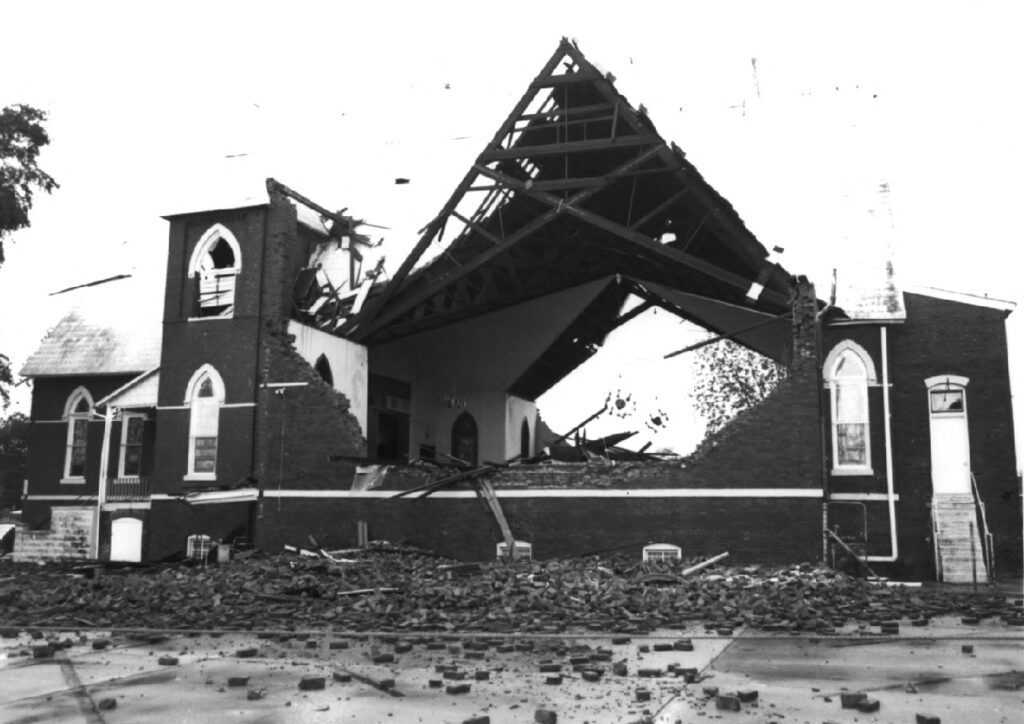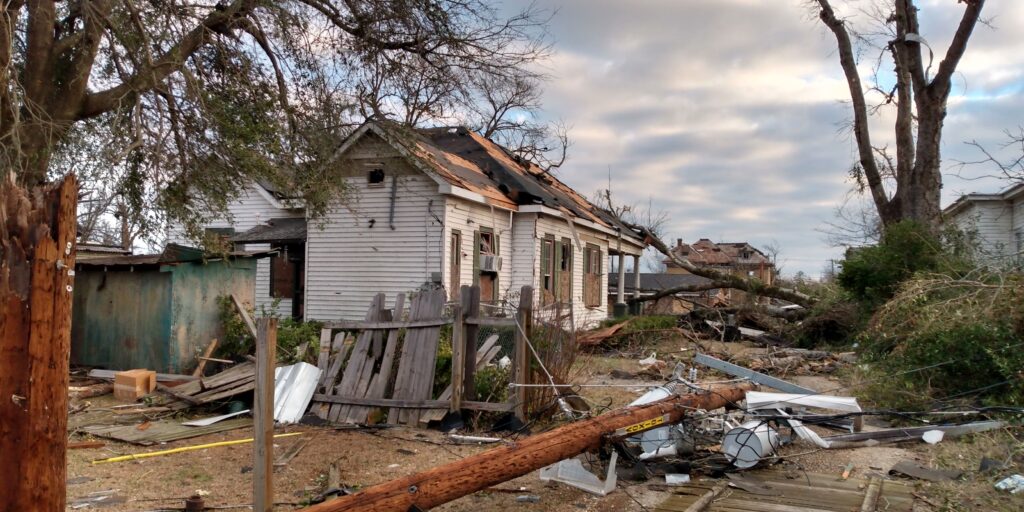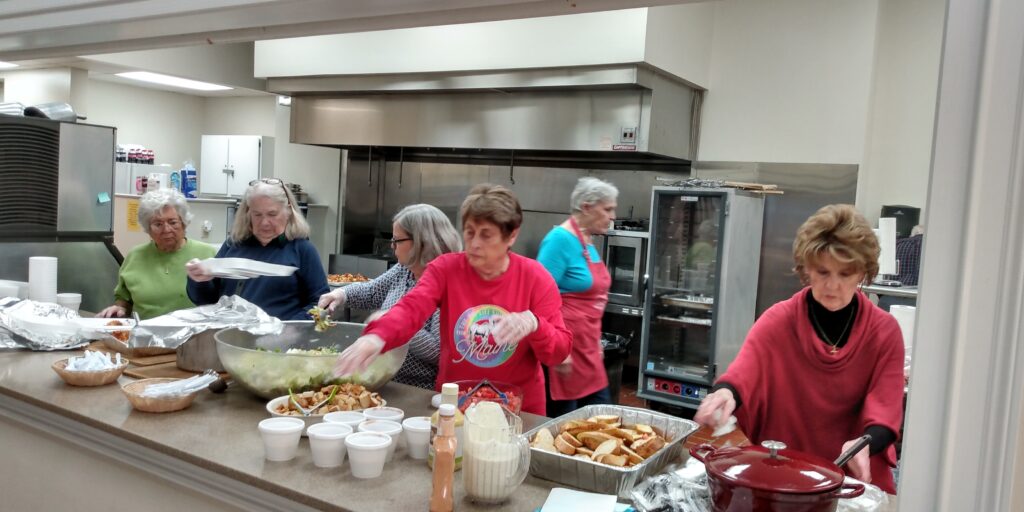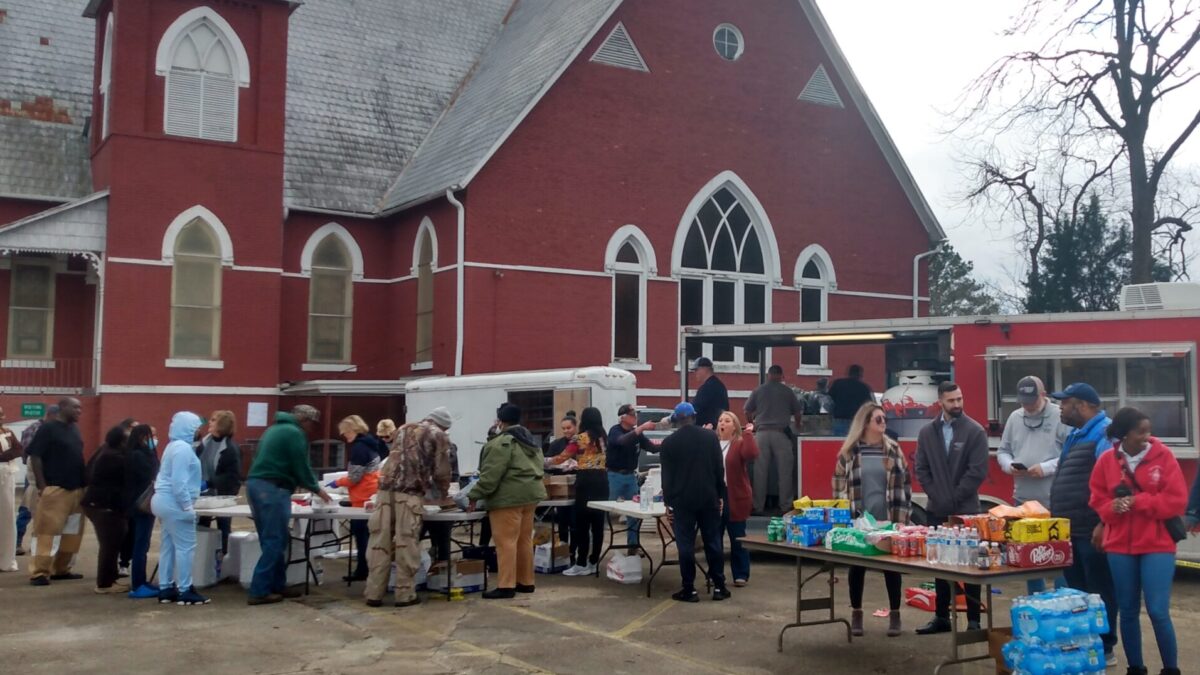Warren William “Billy” Young was just 2 years old when a violent tornado tore through his family’s home church, the historic First Baptist Church in Selma, Alabama, causing devastating damage.
It was 7 a.m. on Monday, May 1, 1978, when the tornado barreled through the sanctuary, destroying its massive brick walls, ripping out its stained-glass windows, and decapitating the towering church spire, the tallest in the city at the time.
One of only a few structures hit, the church looked destroyed. But not to the dedicated First Baptist family of faith. Young’s parents — his father Woodrow, a deacon and trustee, his mother Alice, president of the mission society — and other members rallied together to rebuild the city’s oldest black Baptist church.

They were determined to restore the renowned Gothic Revival to the beauty designed by African American architect David West Benjamin in 1894. Members gathered up bricks the tornado pitched all over the city, signed pledges, took out loans, and slowly put the church back together, using a member’s wedding photograph to reassemble the sanctuary.
Throughout the long recovery, they met in borrowed sanctuaries and never missed a Sunday. “My father often said the tornado could not stop God’s work,” Young said.
A Nightmare Repeated
That strong faith and determination honed in his family church helped to drive Young’s vigorous relief efforts following the tornado on Jan. 12 that destroyed one-third of Selma, his beloved hometown. The high-powered tornado, with winds up to 157 miles per hour, cut a devastating 23-mile path through Selma, destroying homes, businesses, churches, a church daycare center, and more than 1,000 trees. Miraculously no one was killed.

After the tornado struck, Young immediately drove to his church in one of the hardest-hit neighborhoods.
“As soon as I could see our church building standing tall, I knew it had been spared to serve. I knew that First Baptist had a chance to really show God’s love to people who were hurting, and that’s exactly what we’ve been doing.”
Young brought people together to serve meals through his church, feeding up to 800 people a day. They handed out supplies — from tarps, shovels, and rakes to flashlights, food boxes, and diapers — and offered prayers and encouragement to his battered community. Young led recovery efforts not only as a church deacon but also as Selma City Council president, showing how Christians lead in service to others.
“My faith completely took over my actions — all those years in prayer meetings, Bible study, worship — directed me to show God’s compassion to others,” he said.
First Baptist was joined by churches all over the city to fling open their doors and lead an all-out volunteer effort to serve the shocked community and meet immediate needs for food, clothing, and shelter. Churches with mainline Protestant denominations — Southern Baptist, Methodist, Church of Christ, Lutheran, and African Methodist Episcopal — became compassionate, caring centers for the relief efforts needed to respond to the citywide devastation. Sister churches throughout Alabama joined in. “Their work demonstrates their faith because when you are a follower of Christ you want to help those in need,” Young said.
National polls show that churches are losing members: Membership dropped below 50 percent in 2020 for the first time, with mainline Protestant churches experiencing the biggest loss.
But Selma’s church members show how local congregations who know and love their community can respond quickly. They also brought in highly skilled and prepared disaster relief teams from each church body, and have housed other Christian disaster relief organizations, such as Samaritan’s Purse and Eight Days of Hope, that have come to help Selma recover.
“This disaster allowed people to see churches in a different light,” said Young. “Our churches are not just ceremonial buildings but living, breathing organisms that care and love people. We are the ‘boots on the ground’ reaching out to our beloved community.”
Boots on the Ground
Pastor Leodis Strong was working in his office at Brown Chapel AME Church when the tornado sirens started going off at 10 a.m. At first, he ignored them because they’d gone off before. Then his secretary looked out the glass doors and saw the funnel cloud approaching.
“I heard the proverbial roaring train sound — and I never want to hear it again,” he said. After the tornado passed over, torrential rains poured down. “My first concern was the members of our church family, and we immediately started calling them to make sure they were safe and to meet their needs. Then we responded to the needs of the larger community.”
Located near the G.W. Carver federal housing project, Brown Chapel often gives out food boxes and other necessities. Those efforts intensified after the tornado — even though their area wasn’t hit — and they opened doors to FEMA and Red Cross to connect victims to more resources.
Thirteen miles away, Sissy Cooper of Sister Springs Baptist Church, heard the dire weather reports and got ready. As part of the Southern Baptist disaster relief team, Cooper pulled into Selma Thursday afternoon, just hours after the tornado had crushed the city. Her team was out cutting trees off houses the next morning.
More than 30 Southern Baptist disaster relief teams — the third largest in the nation — worked in the community, setting up its headquarters at Selma’s Elkdale Baptist Church, which coordinated relief efforts and helped provide food and shelter for volunteers.
“You can’t do much alone,” said Jerry Tew, a member of a small Baptist church in rural Alabama. “By working with other congregations, you can have a big impact.” Tew has been volunteering with the Southern Baptist relief work for years, including cooking meals for volunteers in New York after 9-11. “Our churches all give to relief work,” he said.
The biscuits were baked and the coffee brewed early Friday morning when Rev. Diane Everette found a clear road to Church Street United Methodist Church in downtown Selma. The kitchen hasn’t been idle since, she said, as teams of church members fix hundreds of meals a day, seven days a week for tornado victims, response crews, and volunteers.

The church opened its doors for Gov. Kay Ivey’s Volunteer Response Center, manned by church members who answered calls for help seven days a week. They house stacks of needed supplies donated by church members throughout the area, Everette said, and also brought in the Methodist disaster relief team.
“It’s a joy,” said member Andrea Livingston, who has clocked more hours than she can count in the church kitchen. “I definitely felt God’s encouragement to do this — it’s a blessing to be able to help.”
The tornado cut a huge swath of devastation around Houston Park Church of Christ, but the church was not damaged. The members quickly rallied, though, cooking and delivering meals to families without power who couldn’t get out of their driveways. Within days, donations started coming in from Church of Christ members all over Alabama and haven’t stopped, said member Loren Morrow. The Churches of Christ disaster relief team from Ohio also arrived and began organizing volunteers to go out in the neighborhoods to tarp damaged roofs, clean up debris, and cut up trees.
“It’s who we are,” said Morrow of her church’s dedication to helping.
Roy Barber, a member of Trinity Lutheran Church in east Selma, got a group of his friends together with their chainsaws early Friday morning to cut up the trees that crashed on houses, power lines, and streets. They also helped locate families that needed help from Shepherd’s Heart Ministry, a Lutheran relief team that arrived the following week.
Across town, Westwood Baptist Church had just finished four nights of prayer for the Selma community. They prayed for unity among the churches, neighborly love, a focus on God, and spiritual support for all the leaders of Dallas County and Selma. Pastor Tim Mathis said they prayed for each leader by name.
Meanwhile, Leroy Wentz with Samaritan’s Purse, a Christian international disaster response team led by Rev. Franklin Graham, was on the road to Selma, praying for a local church to support their work. Within minutes of his prayer, he got a call from Pastor Mathis to come to Westwood.
“They embraced us,” Wentz said. “They have a heart for service that shows in everything they do.” When Samaritan Purse found an 80-year-old woman sleeping in her car, the team immediately cleared the trees from her property and tarped her roof. But she still had trouble getting up the steps to her home. The next day, a team from Westwood built her a ramp.
Young doesn’t know how Selma would have made it this far without the church and its disaster relief efforts that helped hundreds of families. Still, he knows there’s a long recovery ahead.
“First, I thank God that no life was lost due to the tornado,” he said. “Then I pray that our community continues to come together to rebuild; Selma is a 200-year-old beautiful city that needs a lot of tender care. If we put God first – just like we did at First Baptist 45 years ago — Selma and the people of Selma will win!”
To donate directly to the Selma Tornado Relief fund, you can give through Southern Baptist disaster relief, Church Street United Methodist Church of Selma, or First Baptist Church, 709 Martin Luther King St., Selma, AL 36703.









